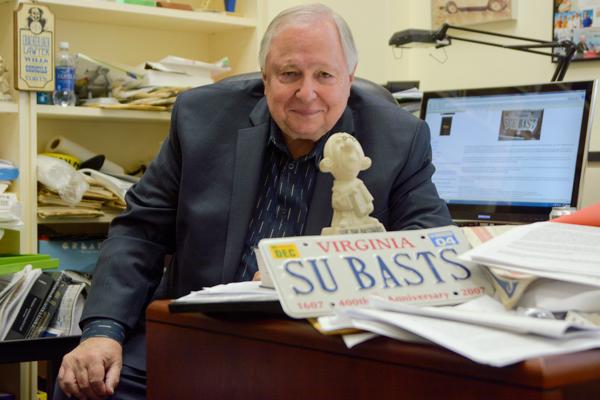GW Law School wants to show how much recognition faculty get in newspapers or on TV.
A new law school website, called “For the Record,” highlights law faculty who are quoted in the media, complete scholarship or hold leadership roles outside of their positions in the school. As law schools compete to recruit a from a dwindling pool of applicants, faculty and experts said finding new ways to highlight faculty expertise can bring the school prestige and attention.
Law school officials declined to comment on when and why the website was created, why it is important to track and highlight numbers like this, how faculty are encouraged to speak to media outlets, create scholarly work or hold leadership roles in organizations and how this level of faculty exposure can improve a law school’s reputation.
The law school has been consistently ranked as a top-tier program and is currently tied for the 25th ranking by U.S. News and World Report.
Neil H. Buchanan, an economist and law professor, is among those faculty members listed on the site and is frequently interviewed by members of the media. Buchanan writes his own blog, Dorf on Law, as well as for a legal website called The Verdict, on which he mainly focuses on economic policy and politics.
Buchanan said interacting with the media improves the law school’s national reputation and professors’ interactions with faculty from other schools because they recognize GW law professors who are regularly featured in the news.
“In terms of the most sort of bottom line concerns about a law school’s reputation, scholarly assessments of the school’s reputation play a big part in ranking systems,” Buchanan said. “When I engage with the media I’m doing it because I think I have something to offer, but it’s absolutely undeniable that when I do that it ends up putting GW Law’s name out there.”
Buchanan said reporters often do not know the inner workings of tax policies or constitutional law, which makes law professionals integral to reporting on complex topics.
“Part of being in a university, public or private, our job is essentially to be informed in a way that we can assist the public in trying to understand issues that would otherwise be too easy to obscure for politicians who would prefer to operate in the darkness and in ignorance,” Buchanan said.
Aside from writing scholarly articles or being interviewed in the media, several law faculty members hold leadership positions outside of the school. Twenty-two faculty members who have held leadership roles in the Association of American Law Schools, according to the school’s new webpage.
Buchanan currently serves as the co-chair of the tax group within the professional Law and Society Association. The group is made up of “sociolegal” law professors and scholars, who seek to understand the law in social contexts.
“That’s something that I’m quite proud of and that has been very successful in terms of helping the University and the law school and doing it in a way that connects it to the other scholars at other universities, and ultimately to policymakers and to real people’s lives,” Buchanan said.
John Banzhaf, a professor of public interest law, said the impact of faculty engagement with articles and the media comes from quotations and op-eds that incite activism, not from law reviews or scholarly articles.
“If you ask many faculty members, ‘Show me a law review article that had a significant impact in changing law,’ they’ll look at you like you’re crazy,” Banzhaf said.
Banzhaf teaches a course called legal activism, in which he said students learn how to be activist lawyers by choosing an issue and bringing about legal action. Banzhaf said that he teaches his students how to effectively use the media to make an impact for their cause.
“I see [the media] as as a tool and as a weapon,” Banzhaf said. “It’s not just writing an article for the sake of writing an article. It’s using it as a targeted tool and as a targeted weapon to achieve a particular results.”
Banzhaf said he did this himself several years ago when he wrote a three-page letter, which eventually led to a ruling by the Federal Communications Commission: For every three cigarette commercials aired, there must be room for one anti-smoking message. Banzhaf said he had originally planned to be a patent lawyer but changed his mind after seeing how his words made a difference.
“So I decided I’m not going to spend my life cranking out patents and litigating patents,” he said. I was going to use my legal skills to do something, to achieve something.”
James Greif, the director of communications for the Association of American Law Schools, said in an email that law professors’ expertise could influence which students choose to attend the school.
“Potential students who are researching which law school to attend might base their decision in part on something they see in the media,” Greif said. “If they like a particular professor’s take on a legal problem, it could be a factor in choosing a law school.”








